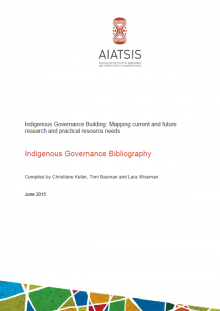Indigenous Governance Bibliography
AIATSIS has compiled this bibliography on Indigenous governance as part of its Indigenous Governance Building: Mapping current and future research and practical resource needs project. It is to be read in conjunction with an AIATSIS bibliography on free, prior and informed consent, engagement and consultation, and other bibliographies relating to various aspects of Indigenous governance which have been included in the following pages and are also available via the project webpage linked above.
The term ‘governance’ is wide reaching and it has not been possible to cover all Indigenous governance related topics comprehensively. Within the context of this project governance is broadly defined as a cultural construct where the principles and standards of what constitutes ‘good’, ‘good enough’, ‘strong’, ‘legitimate’, ‘ineffective’, ‘corrupt’ or ‘bad’ governance are informed by culturally-based values, traditions and ideologies; and vary significantly between different societies. There is no end-point goal of ‘perfect’ governance that will eventually be achieved in the future. Rather, governance is adaptive according to context and circumstances. This means it may swing between effectiveness and dysfunction. It is to be found as much in people’s daily self-determined practices, processes and relationships, as it is in visible structures and formal institutions.
